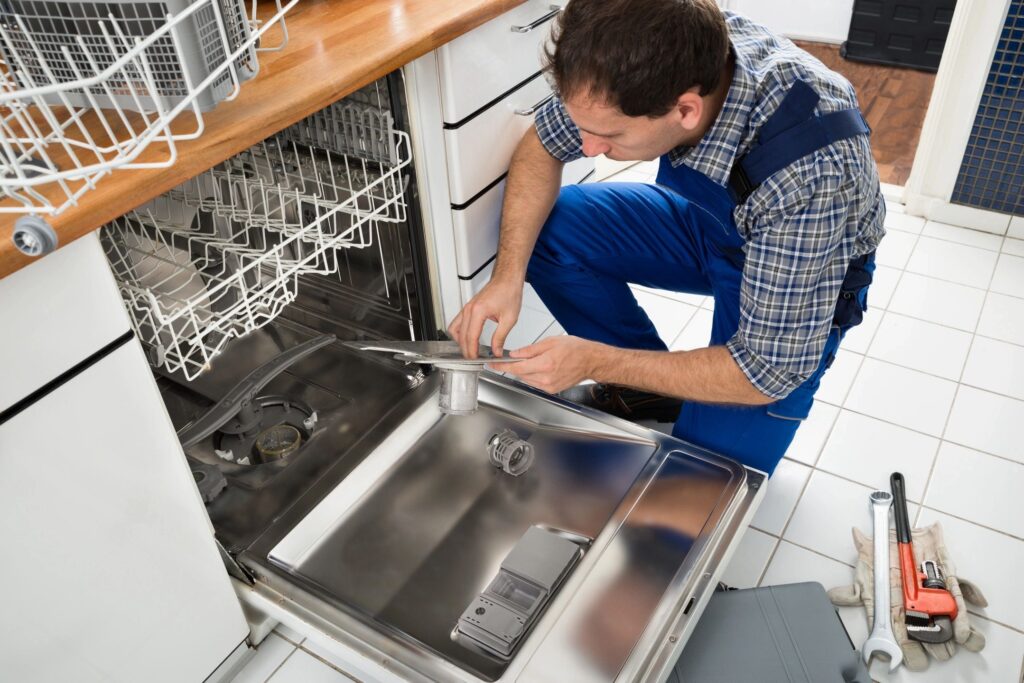Dishwashers have become an essential kitchen appliance in most households, simplifying daily chores by handling the tough task of washing dishes. However, like any other appliance, dishwashers can develop problems over time. Fortunately, many of these issues can be resolved without calling a technician. In this guide, we’ll cover some of the most common dishwasher problems and offer easy-to-follow solutions.
1. Dishwasher Not Cleaning Properly
One of the most common complaints is that the dishwasher isn’t cleaning dishes thoroughly. Dirty dishes after a cycle can be frustrating, but the cause is usually something simple.
Causes and Solutions:
- Clogged Spray Arms: Food particles and debris can block the small holes in the spray arms, preventing water from reaching all the dishes. Remove the spray arms and clean them under running water using a toothpick or small brush.
- Dirty Filter: If your dishwasher has a manual filter, it may be clogged with food scraps. Remove the filter and rinse it thoroughly under warm water.
- Overloading the Dishwasher: Overfilling the dishwasher can block the spray arms and prevent water from circulating properly. Ensure that dishes are not stacked too closely together.
- Detergent Issues: Using the wrong detergent or too much detergent can leave residue on dishes. Make sure you’re using dishwasher-specific detergent and follow the recommended amounts.
2. Dishwasher Not Draining
A dishwasher that won’t drain can leave you with standing water at the bottom of the unit. This issue can occur for several reasons.
Causes and Solutions:
- Clogged Drain Hose: Food particles can clog the drain hose, preventing water from exiting the machine. Disconnect the hose and clear any blockages using a snake tool or by flushing it with water.
- Blocked Air Gap: Some dishwashers have an air gap that can get clogged with food debris. If this is blocked, clean it by removing the cover and flushing it out.
- Faulty Drain Pump: If you’ve checked the hose and air gap and the problem persists, the drain pump might be faulty. A professional repair may be necessary if you suspect a faulty pump.
3. Dishwasher Leaking Water
A leaking dishwasher can damage your kitchen floor and lead to costly repairs if not addressed quickly. The source of the leak could be simple or complex.
Causes and Solutions:
- Worn Door Seal: Over time, the rubber door seal can wear out or crack, allowing water to escape. Inspect the seal for damage and replace it if necessary.
- Loose Hose Connections: Check the hose connections at the back of the dishwasher. Tighten any loose connections to prevent leaks.
- Clogged Drainage System: A clogged drain hose or filter can cause water to back up and leak out of the dishwasher. Ensure that these parts are clean and clear of debris.
- Overfilled Dishwasher: Overloading the dishwasher with too many items can sometimes cause water to splash out. Reduce the load and ensure large items don’t block the spray arms.
4. Dishwasher Making Loud Noises
While dishwashers aren’t completely silent, they shouldn’t make excessively loud noises during operation. Unusual sounds can indicate a problem.
Causes and Solutions:
- Loose Parts: Items like screws or small utensils can get caught in the spray arms or pump. Check the bottom of the dishwasher for any foreign objects and remove them.
- Worn Bearings or Motor: If the noise is a grinding or squealing sound, it could be due to worn bearings or a faulty motor. These parts may need to be replaced by a professional.
- Unsecured Dishwasher: If the dishwasher isn’t properly secured to the countertop or cabinet, it may rattle during operation. Ensure the mounting brackets are tight.
5. Dishwasher Not Starting
A dishwasher that won’t start can be a frustrating problem. Fortunately, it’s often caused by something simple that you can fix on your own.
Causes and Solutions:
- Power Issues: Check to see if the dishwasher is properly plugged in and that the circuit breaker hasn’t tripped. If the breaker has tripped, reset it.
- Door Not Latching: Dishwashers won’t start unless the door is securely latched. Make sure the latch is functioning properly and isn’t obstructed by anything.
- Faulty Control Panel: If the control panel is unresponsive, it could be due to a malfunction or electrical issue. Try resetting the dishwasher by turning it off at the circuit breaker for a few minutes and then turning it back on.
- Child Lock Feature: Some dishwashers have a child lock feature that disables the controls. Check if this feature is activated and turn it off if necessary.
6. Dishwasher Smells Bad
A foul-smelling dishwasher can make your kitchen unpleasant, and it’s usually caused by food debris or mold buildup.
Causes and Solutions:
- Clogged Filter: Food particles can get trapped in the dishwasher filter, leading to unpleasant odors. Clean the filter regularly to prevent this buildup.
- Standing Water: If water remains in the bottom of the dishwasher, it can become stagnant and cause bad smells. Ensure that the drain is functioning properly.
- Mold Growth: If your dishwasher has moisture left over after each cycle, mold can grow. Run an empty cycle with a cup of white vinegar or baking soda to remove odors and disinfect the interior.
- Rubber Seals: Mold can grow in the rubber seals around the door. Clean the seals regularly with a mild cleaning solution or vinegar.
7. Dishwasher Not Drying Dishes
If your dishwasher isn’t drying dishes properly, you may find yourself manually drying them after each cycle, defeating the purpose of using the machine.
Causes and Solutions:
- Faulty Heating Element: Many dishwashers use a heating element to dry dishes. If the element is malfunctioning, it may need to be replaced. This is best done by a professional.
- Use of Rinse Aid: A rinse aid helps dishes dry faster by reducing water spots and improving evaporation. If you aren’t already using a rinse aid, consider adding it to your routine.
- Opening the Door Too Soon: Avoid opening the dishwasher door immediately after a cycle, as it can let out steam and slow down the drying process. Let it sit for a few minutes to allow steam to dissipate.
8. Dishwasher Won’t Dispense Detergent
If your dishwasher isn’t releasing detergent properly, your dishes may not be getting clean, which defeats the whole purpose of using it.
Causes and Solutions:
- Clogged Dispenser: The detergent dispenser can get clogged with detergent residue. Clean it thoroughly with warm water and a small brush.
- Broken Dispenser Door: If the dispenser door isn’t opening during the cycle, it may be due to a broken spring or latch, which will need replacement.
- Incorrect Cycle Settings: Make sure you’re using the correct cycle for the amount of detergent you’ve added. Using too much or too little detergent can also cause issues with the dispenser.
Conclusion
In conclusion, maintaining your dishwasher through regular cleaning and addressing common issues promptly can save you time, money, and frustration. By understanding the root causes of problems like improper cleaning, drainage issues, or strange noises, you can often fix them yourself without needing professional help. However, for more complex issues, don’t hesitate to call an expert. With proper care, your dishwasher will continue to serve you efficiently for years to come, keeping your kitchen running smoothly.


